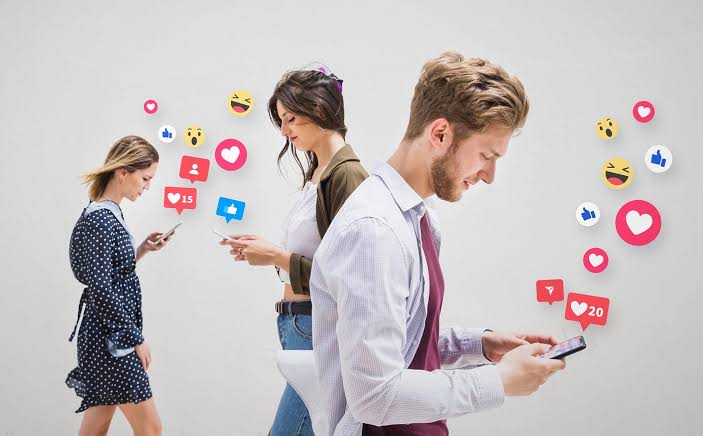Relationship between Smartphones and Social media
Smartphones have shifted the very paradigm of communication and social interactions among demographics in ways that were staggering to fathom a decade ago. This study aims to dissect smartphones as a means through which their intimate connection to social media can shape their overall behavior in multifaceted ways, examining the adverse and advantageous prospects emerging from this technological juxtaposition.
Social Media and Smartphone Integration
Over the last ten years (2010–2020), smartphones have fundamentally altered social media use. Smartphones changed the way people access social media greatly improving convenience and accessibility before these gadgets came into play. Before, people had to use a computer or a laptop. Users could only login at a certain place and time to access social media platforms. The rise of the smartphone meant that this type of connectivity could now be achieved on the way to work, in line at Starbucks, on the bus to school (there's an app for that!),)or just before bed. This allowed for immediate contact and non-stop engagement in terms of active connection.
Accessibility & Connection
Now, for some, our smartphones deliver levels of access to social media that transcend the geographical, socioeconomic and time limitations that largely defined its adoption process in less affluent places." We can participate in discussions on social networks at any time and any place regardless of our present location. . They are rewarding opportunities to understand others through various cultural backgrounds and increase discourse,removing information barriers. Accessibility has played a vital role in this phenomenon as it has equipped the masses with the opportunity to contribute to various online communities that they can now share their stories with others across the globe.
Psychological Impact
The continuous connectivity facilitated by smartphones and social media has raised concerns about its psychological impact. The instant gratification of receiving likes, comments, and shares on social media can trigger dopamine release, leading to addictive behaviors and compulsive checking. This phenomenon, often referred to as "nomophobia" (fear of being without a mobile phone), highlights the psychological dependence on smartphones and social validation through online interactions.
Information Consumption and Awareness
Smartphones play a pivotal role in shaping public discourse and awareness through social media. News updates, viral content, and trending topics spread rapidly across platforms, influencing public opinion and mobilizing social movements. The ability to share news articles, videos, and opinion pieces instantly has empowered individuals to engage in discussions about social, political, and environmental issues, fostering a more informed and connected global community.
Personal Branding and Self-Presentation
Social media platforms accessible via smartphones offer individuals a platform to curate their online identities and personal brands. Users carefully select and edit content to present an idealized version of themselves, showcasing their achievements, interests, and lifestyles. This process of self-presentation can enhance self-esteem and social capital but may also contribute to feelings of inadequacy or social comparison when confronted with curated portrayals of others' lives.
Challenges and Concerns
Despite the benefits, the integration of smartphones with social media raises significant challenges and concerns:
1. Privacy and Security
The collection and utilization of personal data by social media platforms and third-party apps raise concerns about privacy breaches and data security. Incidents of data misuse and unauthorized access highlight the need for robust privacy policies and user awareness regarding data protection measures.
2. Cyberbullying and Online Harassment
The anonymity and accessibility of social media on smartphones facilitate cyberbullying and online harassment. Individuals may experience negative psychological effects, such as anxiety and depression, due to malicious comments, threats, or targeted attacks on social media platforms.
3. Digital Distraction
The constant connectivity enabled by smartphones can lead to digital distraction and reduced productivity. Excessive use of social media may disrupt sleep patterns, impair cognitive function, and negatively impact real-world relationships and academic performance, particularly among adolescents and young adults.
Future Trends and Considerations
Looking ahead, the role of smartphones in shaping social media behavior is likely to evolve with technological advancements and societal changes:
1. AI and Personalization
Artificial intelligence and machine learning algorithms will continue to personalize user experiences on social media platforms. Recommendations for content, ads, and connections tailored to individual preferences and behaviors will enhance engagement while raising concerns about algorithmic bias and manipulation.
2. Augmented Reality (AR) and Virtual Reality (VR)
The integration of AR and VR technologies with smartphones could revolutionize social media interactions by creating immersive and interactive experiences. Users may engage in virtual meetings, explore virtual environments, and participate in shared virtual events, blurring the lines between physical and digital realities.
3. Regulatory Frameworks and Ethical Guidelines
Policymakers, technology companies, and stakeholders must collaborate to establish regulatory frameworks and ethical guidelines for the responsible use of smartphones and social media. Addressing issues related to privacy, content moderation, and digital well-being will be crucial in fostering a safer and more equitable digital environment.
